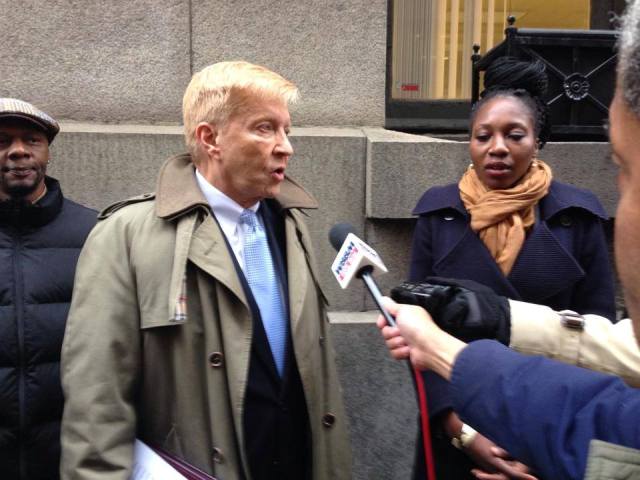Fioretti's Campaign Platform Slowly Coming Together
By Chuck Sudo in News on Dec 15, 2014 10:15PM

Ald. Bob Fioretti speaks to reporters after receiving the endorsement of former mayoral candidate, Dr. Amara Enyia, Dec. 10, 2014. (Photo via Ald. Fioretti's Facebook page.)
We’re two months away from the mayoral election and with a double-digit lead in several polls (although whether it will be enough to avoid a runoff is another matter), Rahm Emanuel is comfortable at this stage in the campaign to stick with what worked for him four years ago—make vague platitudes about rebuilding the city and hoping the recent uptick in street resurfacing and other infrastructure projects is enough to make voters forget the past three-plus years of dragging feet.
The more interesting battle right now is who can force Emanuel into a runoff between Ald. Bob Fioretti (2nd) and Cook County Commissioner Jesus “Chuy” Garcia. Both have picked up key endorsements recently. Fioretti received the support of former candidate, Dr. Amara Enyia, last week. Last week also marked the beginning of a policy initiative by Fioretti aimed at showing he will have the best interests of the city in mind, and has during his years in City Council.
Fioretti introduced four ordinances at last week’s City Council meeting. One calls for hearings regarding the impact of new flight patterns into O’Hare and Midway Airports. Residents who live near O’Hare have been complaining about this issue for decades but it’s a new phenomenon for Bridgeport, McKinley Park and other Southwest Side residents in the vicinity of Midway, and none are happy about the noise and frequent flights flying so low overhead one can often read hull numbers on the planes.
Fioretti called for a re-evaluation of the overnight winter parking ban that has been in place since after the Blizzard of 1979. Fioretti contends that improvements in weather forecasting have allowed residents to better prepare for snowstorms and that the ban has been arbitrarily enforced by various Streets and Sanitation commissioners over the years. Over 200 cars were towed the first night the ban went into effect earlier this month. Fioretti wants to form a subcommittee to study the ban, draft recommendations and “reasonable regulations” in order to free up parking on over 107 miles of city streets overnight during winter.
Fioretti also introduced ordinances to take better action on potholes and a $58 million judgment against the city involving Chicago Loop Parking and competing parking garages. Fioretti brushed off questions about the timing of the ordinances and said these were not submitted “with an eye toward the campaign.” The pothole ordinance, particularly, calls for the Transportation Department to answer why it uses cold patch pothole techniques (a winter pothole patch process which mixes oil with asphalt but isn’t as durable as a hot asphalt patch) during warm weather months.
Fioretti then struck hard at Emanuel’s handling of tax increment financing money in a Friday Sun-Times op-ed. Fioretti does about as good a job as anyone this side of Ben Joravsky at explaining how TIFs work, why sitting on $1.4 billion worth is bad and what he would do with them if elected mayor.
The first step in addressing our city’s financial crisis is to use TIF money for its original purpose: lifting our least-developed neighborhoods out of blight and poverty to create opportunities across all of our communities.We should demand a full audit and accounting of Chicago’s TIF fund and declare a surplus with the vast sum that is not committed to any specific projects or debt. That money is the beginning investment we need to restore our public education program, guarantee the retirement we promised to our teachers, police, firefighters, and other public employees, and put Chicago back on track to financial health for all.
All this is well and good and, if Emanuel is at all panicked that any of these ordinances gain traction, could have the mayor defending his record, which is exactly what Fioretti and Garcia need to force Emanuel to do in order to reasonably challenge him.
Otherwise we’re going to see more ads and articles where Emanuel takes credit for an increase of the minimum wage to $13 an hour that won’t take effect until 2019, and Emanuel-penned op-eds like the one he wrote for CNN Money where he discusses being a champion of small business. Both are calculated at dispelling his “Mayor 1 Percent” stigma and we’re sure many small business owners would be curious to tell the mayor how they really feel.